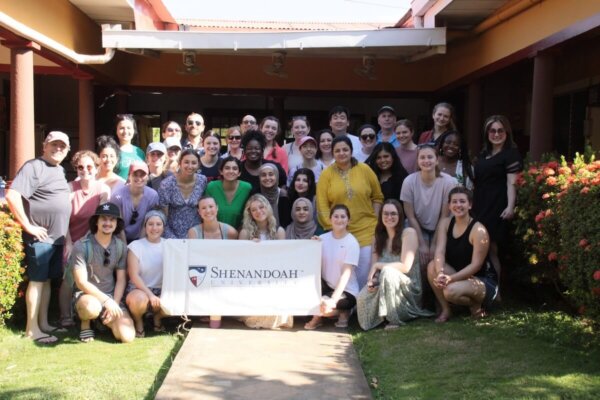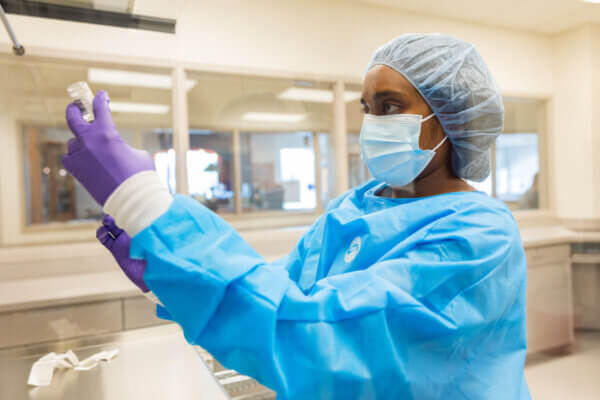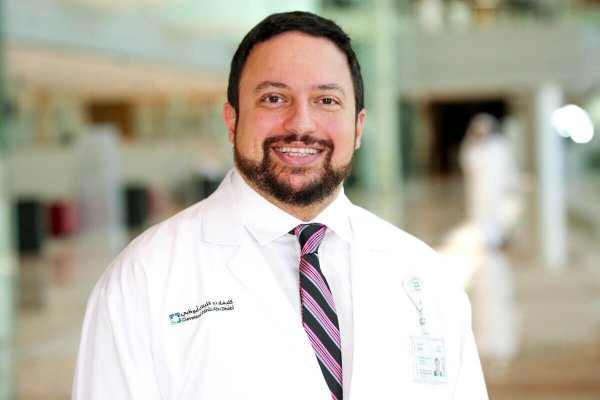If you’re a U.S.-licensed, practicing pharmacist interested in expanding your education, Shenandoah’s all-online nontraditional Doctor of Pharmacy program is the choice for you!
This online pathway offers you the flexibility to complete your studies while working full time. Many of the courses are self-paced, and you may be able to complete the experiential components at your existing workplace.
The Nontraditional Doctor of Pharmacy (NTDP) pathway utilizes much of the innovative information technology that is woven throughout the traditional Doctor of Pharmacy program to enhance the efficiency and effectiveness of the pharmacist as a decision maker. The technology also serves to deliver educational content to you, the learner, when and where you are available to access it. A rich learning environment is achieved by use of a unique learning management system, online educational resources, streaming/downloadable lectures and course content.
Students have the opportunity to interact with pharmacy faculty as well as other members of the cohort throughout the completion of the curriculum. A mixture of recorded lectures, team-based learning outcomes and additional lecture content provides an enriching asynchronous learning environment for the student.
One of my personal goals as a lifelong learner is to continue my professional and personal growth, looking for new challenges and opportunities. After I completed my BS in Pharmacy, I pursued a Master in Public Health degree. Other formal courses that followed were compounding certificates and two compounding expert titles. The next goal for me was to obtain the Doctor in Pharmacy degree. I looked for universities and the SU program had the best alternative that adjusted to my current professional career. The courses are online, with flexible time to study and also have a strong pharmacogenomics component; I consider pharmacogenomics the future of our profession as health providers.”
Marisol Lopez ’22, RPh, MPH
Classes
Students learn in a cohort-based format, with a flexible online curriculum that requires minimal time on campus. You are provided:
- up-to-date information regarding clinical disease states and their treatment
- the skills to assess and intervene in medication regimens
- course material that reflects the current and future practice of pharmacy
- patient cases to apply didactic knowledge
What Makes Our Program Unique?
The online Nontraditional Doctor of Pharmacy (NTDP) pathway utilizes much of the innovative information technology that is woven throughout the traditional Doctor of Pharmacy program to enhance the efficiency and effectiveness of the pharmacist as a decision maker. The technology also serves to deliver educational content to you when and where you would like to receive it. In addition to extensive use of the Internet, the pathway provides educational support to create an information-rich learning environment. Each student has access to a resource team consisting of full-time pharmacy faculty members and computer support staff.
The format and delivery allow you to work full-time while completing the courses through distance education. As you progress through the online curriculum you become more technologically confident and literate. A mix of audio, video, and Microsoft Office files are utilized to deliver the content through a user-friendly learning management system. In addition to the course material, a significant investment has been made in electronic databases and textbooks, which are available and accessible to the nontraditional students 24 hours a day to enhance and supplement the learning experience.
The flexible online curriculum pathway fit my lifestyle and status as a full-time pharmacist, and according to what was projected on the website, it looked quite organized and promising to me. Once the pathway started, it exceeded my expectations. The courses and assignments have challenged my knowledge and added more confidence in my performance.”
Indira Purcell-Murphy ’22
Nontraditional Pharmacy Pathway Curriculum
The NTDP Curriculum consists of 53 credit hours, 38 credit hours of didactic courses and 15 credit hours of experiential education.
All students must attend one on-site clinical skills assessment during the program.
| Course Number | Course Title | Credits |
| PHRN 534 | Essentials of Pharmacogenomics | 2 |
| PHRN 600 | Principles of Pharmacokinetics | 3 |
| PHRN 608 | ICARE: Renal | 2 |
| PHRN 619 | ICARE: Cardiovascular | 4 |
| PHRN 632 | Applied Pharmacokinetics & Pharmacogenomics | 1 |
| PHRN 662 | Drug Literature Analysis/Interpretation | 3 |
| PHRN 681 | ICARE: General Medicine | 3 |
| PHRN 709 | ICARE: Hematology/Oncology | 3 |
| PHRN 720 | ICARE: Neurosensory/Psychiatry | 3 |
| PHRN 723 | Patient Assessment | 2 |
| PHRN 733 | Applied Pharmacokinetics & Pharmacogenomics II | 1 |
| PHRN 734 | Applied Pharmacokinetics & Pharmacogenomics III | 1 |
| PHRN 742 | ICARE: Infectious Disease | 4 |
| PHRN 746 | ICARE: Endocrine | 2 |
| PHRN 747 | ICARE: General Medicine II | 2 |
| PHRN 748 | ICARE: Special Populations | 2 |
| PHRN 800 | Ambulatory Care APPE | 5 |
| PHRN 803 | Inpatient Acute Care APPE | 5 |
| PHRN 804 | Elective APPE | 5 |
| PHRN 840 | Community APPE | 0 |
| PHRN 841 | Institutional APPE | 0 |
| PHRN-842 | Continuing APPE | 0 |
| 53 total credits |
ICARE: Integrated Pharmaceutical Care and Science
APPE: Advanced Pharmacy Practice Experience
Estimated Program Costs
Estimated Program Costs (as of Fall 2024):
- Tuition: $43,150
- Pharmacy clinical fee: $1,175
- Technology fee: $995 (based on 8 semesters)
- Application fee: $30
- Total cost: $45,350 (based on 8 semesters)
Tuition rates and fees are subject to change each academic year in the Fall semester.
Faculty
Application Information
Students are admitted as members of a cohort once a year in the fall semester (August). Cohorts consist of students who start at the same time and progress through the curriculum at the same pace, but we can accommodate students who require a slower pace.
Shenandoah University’s Bernard J. Dunn School Of Pharmacy prepares you to effectively serve patients in a diverse range of settings as a valued member of the health care team. Start your application now.
Pharmacy Application Information
The NTPDP gave me the tools and clinical knowledge I needed to stay ahead in a very competitive pharmacy market. The program was hard work but was also very flexible and extremely organized. The instructors were top notch and the program coordinators were always helpful and supportive. The PharmD has sharpened the clinical skills that I need to carry on with my current position as a pharmacist in an outpatient clinic setting. It enabled me to initiate new clinical pharmacy services that were not utilized in my community for patients with uncontrolled diabetes and hypertension. It also kept me up to date to be able to maintain those services and create a patient-outcome-driven pharmacy clinic. It is a blessing for me and I can’t wait to move on and get my board certification in ambulatory care pharmacy, which will build on the knowledge and guidance I got from the NTPD program. Thank you, Shenandoah University Bernard J. Dunn School of Pharmacy, for offering such a state-of-the-art program to help pharmacists like me achieve what we want.”
Raed Ahmed ’21, PharmD
NTDP Frequently Asked Questions
Is financial aid available?
For graduate course work there is limited aid available. The most common source is low interest government loans as well as tax credits for interest on educational loans or for education.
We encourage you to check with your employer for tuition reimbursement or assistance. The questions that you should ask your employer are:
- Do you need a course grade before submitting for reimbursement?
- Is there a maximum dollar amount you can submit to your employer in a calendar or budget year?
- Does the reimbursement vary depending upon the grade you achieve in the class?
- What does receiving tuition assistance from your employer obligate you to do? (i.e. Are you required to work 1 hour for every dollar of assistance you receive?)
Will I be considered a full-time student?
Individuals enrolled in the nontraditional pathway at Shenandoah University will be considered part-time graduate students.
How many trips to the school will there be?
There is one required visit, which involves an on-site capstone clinical skills assessment that occurs toward the end of your didactic course sequence.
There is one optional visit upon completion for hooding and commencement ceremonies in May.
How or do you get credit for prior work or life experience in lieu of the APPE courses?
Credit is given for an individual’s experience based upon the ability to fulfill the requirements of a prior-life portfolio. The portfolio is a detailed submission of documentation validating a student’s work experience in relation to the experiential requirements for the degree. Only 2 out of 3 of the required clinical experiences may be completed in this manner.
Students must still register and pay for the experiential courses to facilitate grade entry and required curriculum credits.
Can someone transfer to SU and what happens to the credits I have taken?
Yes, you can transfer into the NTDP Pathway at SU. Submit a copy of the transcripts from the school of pharmacy you have been attending for your nontraditional Doctor of Pharmacy degree as these are a requirement for consideration of admission. You will also need to provide a letter of support from the SOP pharmacy administration speaking to your time as a student and standing. Your credits from other programs do not count as credit towards any of our classes due to the unique design of our curriculum.
When can I start?
The nontraditional pathway has one cohort starting during the fall semester in August each year.
Is the Nontraditional PharmD Pathway at SU accredited?
The school of pharmacy was first accredited in July 2000 from the Accreditation Council for Pharmacy Education (ACPE), and remains accredited. The accreditation of the school of pharmacy signifies that the traditional and nontraditional pathways are both accredited.
How is the experiential phase of the curriculum accomplished?
Clinical experiences may be completed in your place of employ if the site is able to provide the required competencies to prevent you from taking time from work. You will complete either practice or prior-life portfolios or on-site experiences to document your achievement of the objectives for the Advanced Pharmacy Practice Experience (APPE) in Ambulatory Care, Acute Care, and Medication Information.
APPEs that cannot be accomplished within your place of employ may be completed on a part-time basis proximal to your location that will allow you to work full-time and fulfill the experiential requirements at the same time. It is your responsibility to identify potential sites and to convey this information to the School of Pharmacy at the appropriate time.
- You may have the opportunity to “opt-out” of up to 2 of the 3 required clinical experiences by successfully completing prior-life portfolios.
- Clinical experiences, except prior-life portfolios, are completed after finishing all didactic courses.
How long does it take to complete the curriculum and when will I graduate?
Students vary in the time they take to complete the requirements. If you are already working in a clinical position and are eligible for 2 prior-life portfolios, then you may be able to graduate in 7 semesters. If you have not worked in a clinical position, then it will probably take at least 8 semesters to complete. Graduation is available three times a year in May, December, and August.
Awarding of the degree and eligibility for graduation will be considered for the next available university graduation provided all requirements have been successfully completed.
What if I have to drop out indefinitely?
We realize that there are occasionally unforeseen circumstances which may require that a student temporarily take a leave of absence. It is very important that you keep the school informed if you foresee that you may not be able to continue as scheduled.
After one year you must reapply, which means that you must fill out the required application forms including submitting the application fee. It is not necessary to resubmit a copy of your pharmacy license, official transcripts, or letters of recommendation.
If you fail to reapply, you will no longer be an active student and your login access will be denied. Any student who must reapply and be readmitted to the University will not receive any financial credit for outstanding credit hours and will be billed for all remaining courses and credit hours at the current tuition rate. If you do not complete the clinical experiences (APPEs) for which you have registered before being dropped as an active student and choose to reapply, you will be reregistered and billed for any remaining experiences at the current tuition per credit hour rate.
NTDP Technology Requirements Review
This is a review of the technology requirements for the NTDP program.
Be Prepared For On-Site Visits
- If you’ve purchased a new laptop, make sure you’ve spent time using it so you feel comfortable with the device before you come for the weekend.
- We recommend bringing a cordless mouse if you aren’t familiar with using the track pad on your laptop.
- Also, make sure you have administrator rights on your laptop. This means you will be able to install and update software yourself.
- While you can do the majority of the program on mobile devices be sure to bring your laptop and not just your iPad/other mobile device.
The Minimum Recommended Laptop Configuration
- Computer: PC or Mac laptop
- Internet access: Broadband connection (DSL, cable modem, etc.)
- Processor: Intel Core 2 or faster
- RAM: 8GB or more
- Microphone: Sound card with speakers and a microphone (built-in or external)
- Wireless compatibility: 802.11b/g/n card
- Operating System: Windows 7 or later | Mac 10.10 or later
Software You Will Need Installed Before The Executive Weekend
- Microsoft Office 2010 or later (Windows) or Microsoft Office 2011 (Mac)
- Current versions of Microsoft Office Home & Student or Microsoft Office 365 University are fine
- Be advised Google Apps does not offer 100% compatibility with Office
- Antivirus Software: McAfee, Symantec, BitDefender or another comparable antivirus software package
- If you have anti-virus software that came with your laptop, be sure you have a subscription for updates. Many times you only get a 90-day trial of the software.




